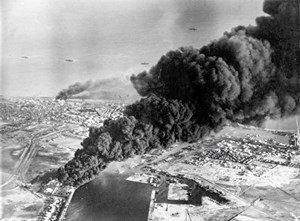Suez Crisis: A threat to European oil supply
In July 1956, Egyptian President Gamal Abdel Nasser announced the nationalization of the Suez Canal, which was a primary conduit for oil export shipments. It has been suggested that this action was in response to a refusal by the U.S. and Britain to help fund Egypt’s Aswan Dam project. The U.S. and Britain cited the Egyptian economy as the reason, but many analysts believe it was because of Egypt's decision to recognize China and buy weapons from Czechoslovakia.
On Aug. 2, Britain mobilized its armed forces, following talks between Britain, the U.S. and France the previous day, concerning the rapid escalation of the crisis. At an Aug. 16 conference of 22 nations in London, which President Nasser refused to attend, 18 of these nations agreed to a proposal for international management of the canal. Nasser rejected the plan after being visited by Australian Prime Minister Robert Menzies.
On Sep. 12, 1956, Britain, France and the U.S. planned to proceed with plans for a Suez Canal Users Association (SCUA), despite Egypt’s rejection, and launch the SCUA the following month. The United Nations Security Council met to discuss endorsing SCUA, but no vote was taken.

Britain, France and Israel met in secret on Oct. 24, 1956, and signed the Protocol of Sevres. They also agreed on a plan—code-named Operation Musketeer—to invade Egypt. Israel was to attack the Egyptian Army, near the canal, as a pretext for military intervention by Britain and France. Israel was angered by cross-border raids from the Sinai Peninsula and intended to break the Arab blockade of the Gulf of Aqaba, to open a secure outlet to Asia and Africa from its Port of Eilat.
Britain and France, in a coordinated attack with Israel, temporarily seized the canal in October. Half of the canal's traffic was petroleum, and the ensuing crisis from its closure threatened Middle Eastern oil shipments, which supplied about 800,000 bpd to Europe. Israel invaded the Gaza Strip and Sinai Peninsula on Oct. 29, 1956, as troops headed toward the Canal Zone. Two days later, Britain and France began bombing to force reopening of the canal. Nasser responded by sinking 40 ships in the canal.
The first emergency meeting of the United Nations General Assembly took place in November 1956, to discuss calls for an immediate ceasefire in the crisis, but this was vetoed by Britain and France, who claimed to be acting as a "police force" in international interests. On Nov. 5, after the UN ultimatum for agreement to a ceasefire expired, Anglo-French forces landed at Port Said (668 British paratroopers at Gamil airfield and 470 French paratroopers at two bridges on the canal at Rawsa).
The intervention stoked Cold War tensions, and U.S. President Eisenhower ordered a withdrawal to avoid a showdown with the Soviet Union. In a 1957 speech to Congress, Eisenhower said the Middle East would be a prize for international communism, and asked Congress to provide economic and military support for any nation, or groups of nations, in the region with "governments manifestly dedicated to the preservation of independence and resistance to subversion."
Britain and France finally agreed to a UN ceasefire on Nov. 7, after pressure from the international community, led by the U.S. Anglo-French forces may have occupied most of the Canal Zone, as far as Ismailia, at that time. The first UN troops landed at Port Said on Nov. 21. British and French troops had withdrawn from the area by Dec. 23, and the UN Emergency Force (UNEF) took control of the Suez Canal.
As a result of the Suez Crisis, Britain and France found their influence as world powers weakened, and Israel began attracting attention for its military capabilities. However, the Straits of Tiran were once again open to all, and the first international UN force was established on the Sinai Peninsula as a buffer between Egypt and Israel. ![]()
- Applying ultra-deep LWD resistivity technology successfully in a SAGD operation (May 2019)
- Adoption of wireless intelligent completions advances (May 2019)
- Majors double down as takeaway crunch eases (April 2019)
- What’s new in well logging and formation evaluation (April 2019)
- Qualification of a 20,000-psi subsea BOP: A collaborative approach (February 2019)
- ConocoPhillips’ Greg Leveille sees rapid trajectory of technical advancement continuing (February 2019)


